International educational institutions aim to provide their students with the skills and attitudes needed for the exciting careers which are now possible in our globalized and interconnected world. Below, we sketch out a journey through the life of someone who receives an international education, moving from a child’s first steps into the social world of school through to enjoying a career in an international environment. In order to determine what the key characteristics of an international education are, we spoke to three institutions involved in the education of citizens of the world: the American School of Valencia, the CEU Cardenal Herrera University and the HR consultants, Page Group.
Getting an education at an international school: the view from the American School of Valencia
The ASV has been providing international education since 1980, from Preschool right through to High School. Its academic philosophy is based on the USA’s Common Core standards, Spain’s national curriculum and the programme required for the International Baccalaureate. We discussed the school’s educational model with Felicitas Berazay, the Director of Admissions, and Carlos Minuesa, the Communication Coordinator.
What is multilingual education and how does the school go about providing this?
At our school, we provide a multilingual education, first of all, by using English as the medium of instruction. In the 5th grade of Primary Education, we introduce French or German. We immerse our students in English from the very first day, with all subjects being taught in English. Children are able to understand any language through the interpretation of gestures, movements and facial expressions. Their ability to absorb communication in this way is much greater than that of adults.
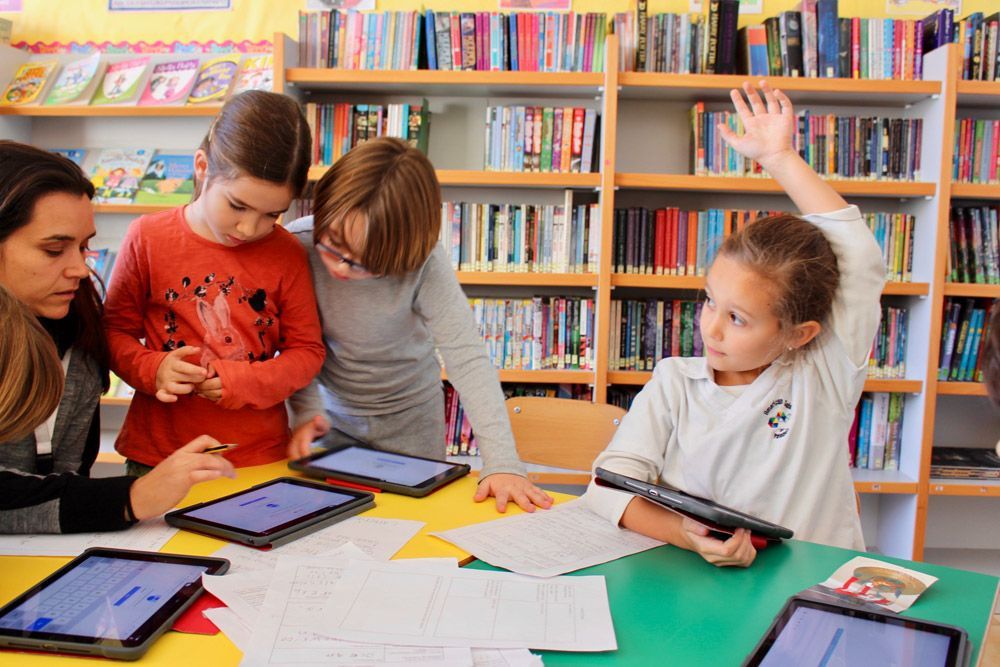 We facilitate learning through listening, playing and by encouraging communication. This system requires our pupils to actively participate, to cooperate with each other, to compare ideas, to try to find solutions and to create projects. It encourages them to develop their comprehension skills, to think critically, to become comfortable giving oral presentations, to summarise and explain what they know and to work flexibly and creatively. All this means that they can tackle future challenges in the outside world with great confidence.
We facilitate learning through listening, playing and by encouraging communication. This system requires our pupils to actively participate, to cooperate with each other, to compare ideas, to try to find solutions and to create projects. It encourages them to develop their comprehension skills, to think critically, to become comfortable giving oral presentations, to summarise and explain what they know and to work flexibly and creatively. All this means that they can tackle future challenges in the outside world with great confidence.
What effect do you think this type of education has on the child’s intellectual and emotional development?
Intellectually, their development of linguistic structure is much, much richer. Pupils at an institution like ours have to make a greater effort as they are learning in a language which is not their native tongue.
Emotionally, the impact will vary depending on the child’s personality, but I think that, in general, they acquire greater self-confidence. At a very early age, they lose that sense of embarrassment that we often feel when talking to someone in a different language. In a school like ours, the language is a springboard for them to meet people of different nationalities, to travel, and to experience other environments. So, an international education helps you connect with the world.
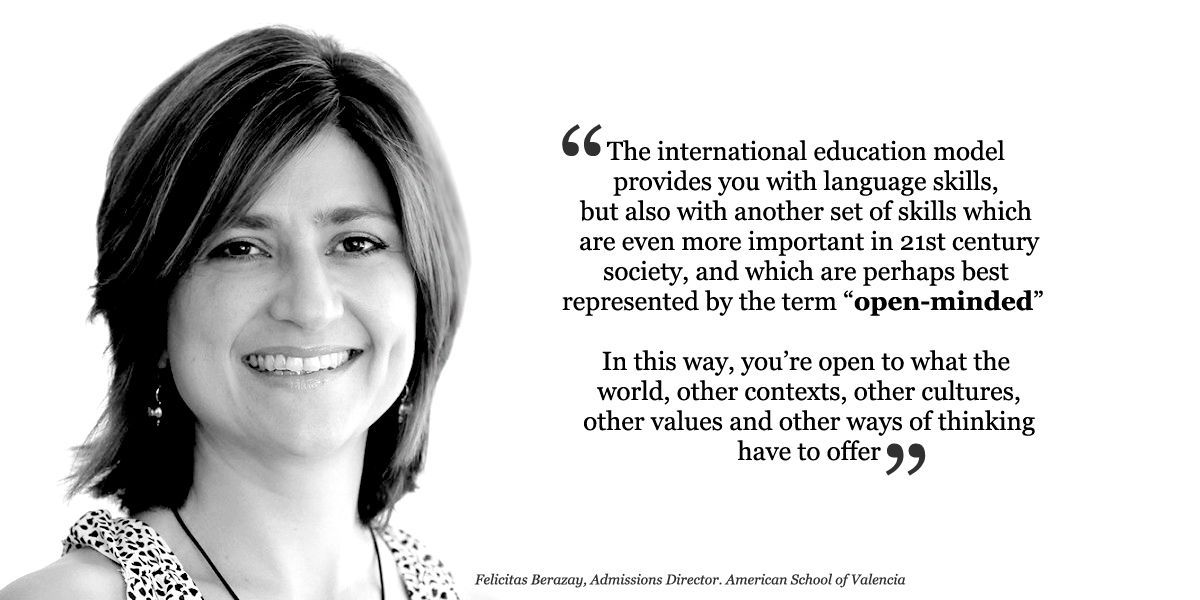 What does an international education prepare you for?
What does an international education prepare you for?
We believe that the international education model obviously provides you with language skills, but also with another set of skills which are even more important in 21st century society, and which are perhaps best represented by the term “open-minded”. In this way, you’re open to what the world, other contexts, other cultures, other values and other ways of thinking have to offer. That facilitates our pupils’ future integration into multidisciplinary or international teams.
Being able to speak different languages is important, but we also believe that our pupils need to understand that, while the world is a big place, it is also interconnected. Therefore, respect, ethics, empathy and consideration of others are all things you need to take with you in order to be the best kind of professional and citizen. Our aim is for our students to be used to change, to able to deal with it as and when it comes and to be adaptable by the time they leave the school. They should be able to adapt to different situations, to handle changes without too much difficulty, and to have acquired the habit of learning throughout life. All this will enable them to take on the challenge of having to reinvent themselves and adapt as many times as they need to in their careers.
Getting an education at an international university: the view from the CEU Cardenal Herrera University
For some years now, CEU UCH has been undergoing a process of profound internationalization. Students from more than 70 countries now study at the University, programmes are taught in Spanish, English and French, and the University has worked hard to create a global campus which is open to people from across the world. To learn more about this, we spoke to Chirag Sheth, the Deputy Vice-Rector for Internationalization.
People still seem to believe that an international education is mainly about improving language skills. What does education of this type offer other than being able to learn a foreign language?
CEU has created an environment where international cultural exchange is possible. Students from across the world can come together and interact with each other. The atmosphere is a friendly one and the University can offer personalized academic support, something which sets it apart from other international universities.
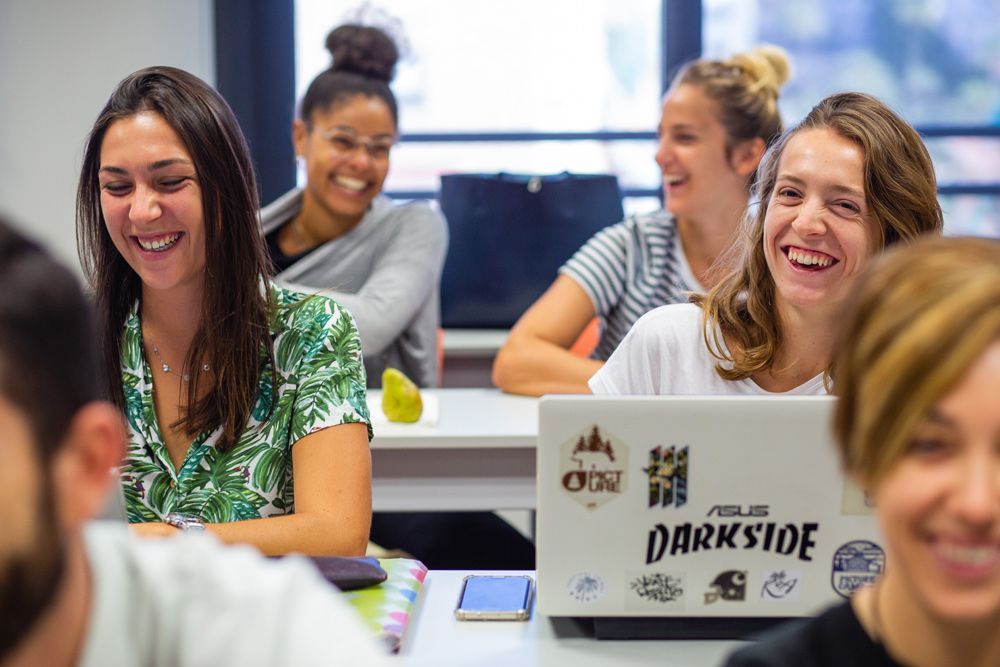 The lecturers’ involvement in the internationalization process is the key. This enables students to immerse themselves in a truly comprehensive and profound international educational atmosphere from day one. And we have a system in place to offer support to international students from their arrival right through to graduation.
The lecturers’ involvement in the internationalization process is the key. This enables students to immerse themselves in a truly comprehensive and profound international educational atmosphere from day one. And we have a system in place to offer support to international students from their arrival right through to graduation.
In what do students from Spain benefit from studying alongside so many international students on the same campus?
You can’t compare the experience the Spanish students have at our University with that of other universities which haven’t undergone an internationalization process. The mixture of cultures and opportunities to exchange ideas and forge friendships across different nationalities are at the heart of the humanistic education our students receive. Being able to interact with others in this way means that our students can develop valuable skills in interpersonal relationships, teamwork, empathy, and in being open-minded towards other beliefs and philosophies. So, our Spanish students are able to have an international experience without leaving their home country.
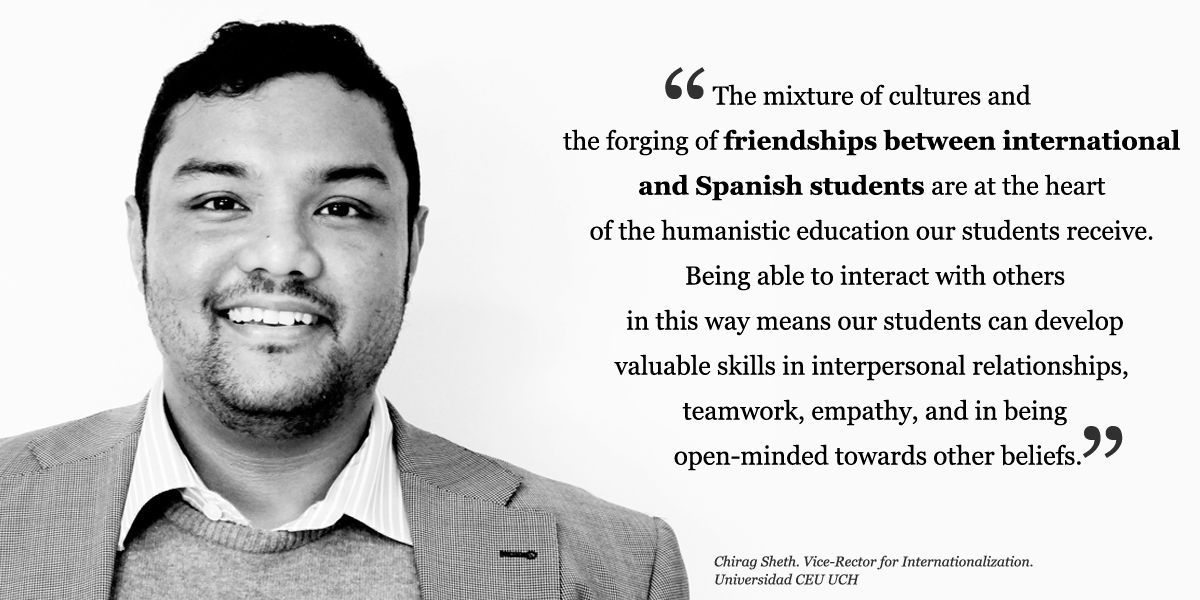 What value does studying at an international university like CEU UCH bring to a graduate’s CV?
What value does studying at an international university like CEU UCH bring to a graduate’s CV?
There’s a clear advantage for them when they enter the job market. The education students receive at an international university is enhanced by the exchange of ideas and different experiences that each student can bring to class discussions. Students improve in self-confidence, critical thinking and ability to work as part of a team by forming part of a diverse group in different lectures. They acquire a respect and tolerance of other cultures and have better communication skills. Through being in contact with fellow students from a range of different places, our students benefit from improved decision-making which in turn reinforces positive professional habits. The ability to adapt to changing environments is highly valued by employers and this will continue to be a key skill in the future.
Professional development in an international environment: the view from HR consultants Page Group
PageGroup is the leading international recruitment agency for middle and senior managers. Their experience in talent selection goes back to 1976 and they now have a presence in 36 countries across the world.
Do employers value and actively look for candidates with an international profile?
For the big multinationals, hiring staff with an international profile is now routine. SMEs are now starting to wake up to this trend. There’s been a big change, especially in the digital and technology industries, at the IT giants, at the car companies and at the big retail companies.
International candidates are also needed in order to establish shared service centres (SSCs), where the big multinationals centralize their core services in one country. Spain is becoming one of the leading choices for many European organizations to locate their SSCs.
What are the most sought-after skills for candidates to have?
Right now, there’s a fundamental trait that everyone needs to acquire if they want move forward in their career: adaptability. Today’s working environment is changing faster and faster and so we have to be able to adapt to emerging technologies, to different types of communication, to periods of crisis and growth, to organizational changes, and to new managers and new generations.
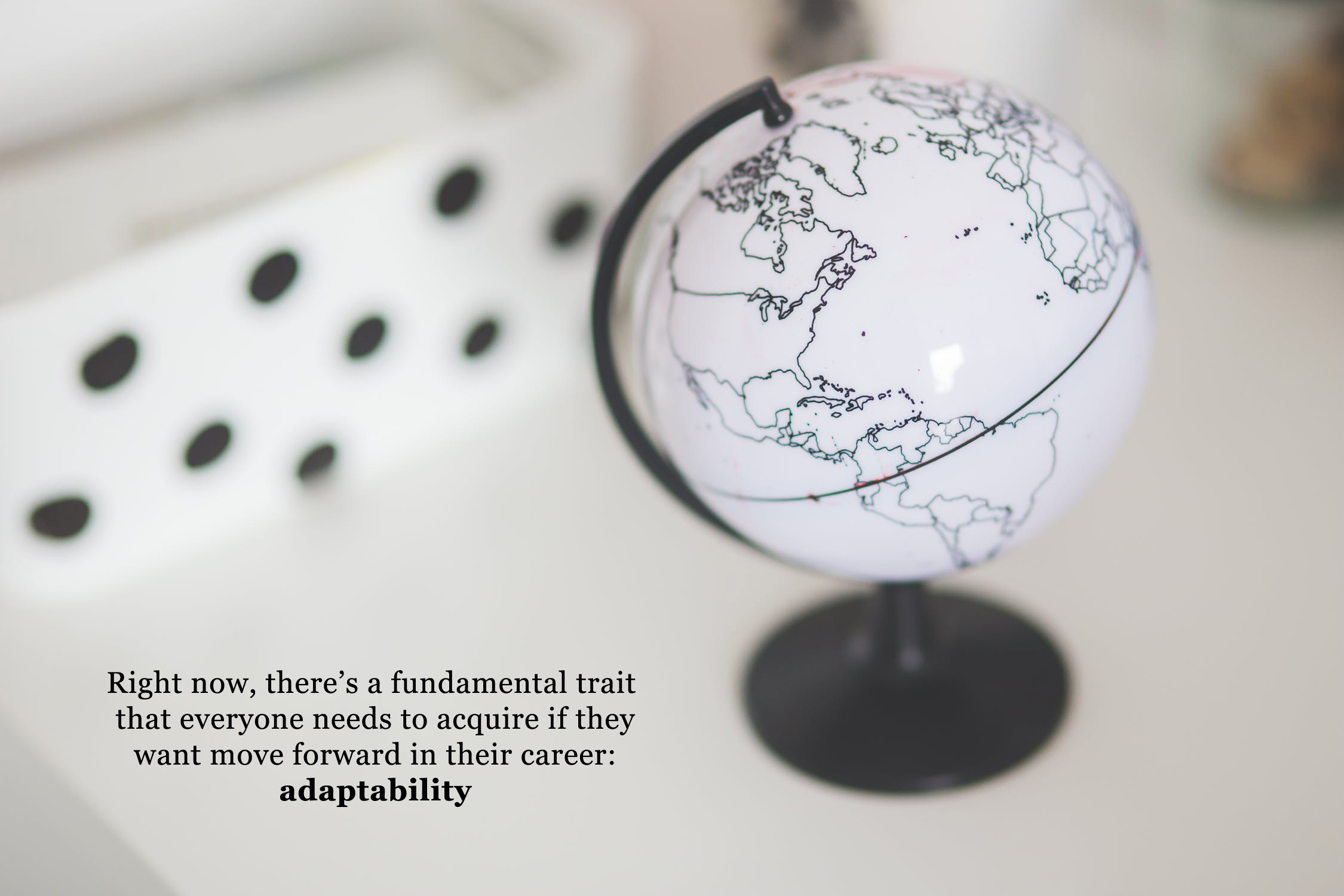 That’s why the way in which candidates are assessed has changed. Experts in recruitment now focus more on emotional and situational intelligence, looking for people with an enhanced ability to learn and think critically. You want a balance between technical or hard skills and soft skills, which concern being open-minded and having an adaptable personality which fits with the company’s strategy and culture.
That’s why the way in which candidates are assessed has changed. Experts in recruitment now focus more on emotional and situational intelligence, looking for people with an enhanced ability to learn and think critically. You want a balance between technical or hard skills and soft skills, which concern being open-minded and having an adaptable personality which fits with the company’s strategy and culture.
The key question is this: what skills will make improve productivity and grow the business? In Spain, these are: resilience, flexibility, empathy, adaptability and the ability to work autonomously.
Is there a link between an international education and the ability to adapt to change?
Candidates who’ve had an international experience have had the chance to develop new skills and abilities which were only latent up to that point. Moving out of your comfort zone is difficult at the beginning, but the fact is that having an international experience is always rewarding. It broadens your mind, it enables you to gain knowledge of other cultures, to apply your professional knowledge in another environment, and to learn new languages, and you can even come to really know yourself better – and this is a key part of personal development. It’s highly recommended for your personal and professional growth.
The complexity of the social and technological change that we are seeing across the world means that traditional educational models must also change and adapt. The challenges we now face include lifelong learning, being positive about change, forming part of multinational and multicultural teams, being able to apply critical thought and to communicate successfully. This is what today’s new generations are faced with. Being able to educate young people to deal with these challenges successfully is another challenge, of course.






